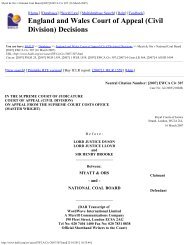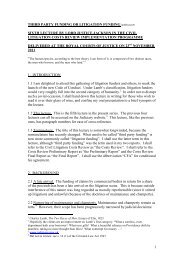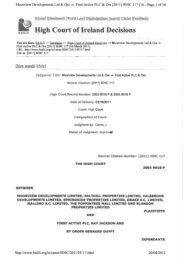[2013] SGHC 135 - Singapore Law Watch
[2013] SGHC 135 - Singapore Law Watch
[2013] SGHC 135 - Singapore Law Watch
Create successful ePaper yourself
Turn your PDF publications into a flip-book with our unique Google optimized e-Paper software.
<strong>Law</strong> Society of <strong>Singapore</strong> v Kurubalan s/o Manickam Rengaraju [<strong>2013</strong>] <strong>SGHC</strong> <strong>135</strong><br />
... if it is contrary to public policy for a lawyer to have a<br />
financial interest in the outcome of a suit, this is because (and<br />
only because) of the temptations to which it exposes him. At<br />
best he may lose his professional objectivity; at worst he may<br />
be persuaded to attempt to pervert the course of justice.<br />
44 Similarly, Professor Pinsler SC (Jeffrey Pinsler, Ethics and<br />
Professional Responsibility: A Code for the Advocate and Solicitor (Academy<br />
Publishing, 2007)) has noted (at para 13-030) that the rationale for s 107 of the<br />
Act and r 37 of the Professional Conduct Rules lay in:<br />
... the conventional wisdom that the advocate and solicitor<br />
must maintain his independent and professional standing<br />
(unaffected by any personal interest in the outcome of the<br />
matter) in order to be able to act effectively in representing his<br />
client’s interests.<br />
45 In our view, one of the key elements in effectively representing a<br />
client’s interest is the ability of the lawyer to maintain a sufficient sense of<br />
detachment so as to be able to discharge his duty to the court. That duty is<br />
ultimately paramount and trumps all other duties. It follows that the<br />
considerations most engaged by the offence of champerty are those concerning<br />
the administration of justice and the related need to safeguard confidence in<br />
and the honour of the profession that is tasked with the vital role of assisting<br />
the judiciary in their mission: see Ravindra Samuel at [12]. But these are not<br />
static principles; with the passage of time comes a better understanding of how<br />
these should be appreciated and weighed with new considerations. As Dixon J<br />
pointed out in Stevens v Keogh (1946) 72 CLR 1 at 28:<br />
The law of maintenance is founded not so much on general<br />
principles of right and wrong or of natural justice as on<br />
considerations of public policy (per Lord Esher): Alabaster v<br />
Harness [1895] 1 QB 339. Notions of public policy are not<br />
fixed but vary according to the state and development of<br />
society and conditions of life in a community. The exceptions<br />
or justifications which allow a person or body of persons to<br />
maintain a litigant in a suit do not form a closed category.<br />
25


![[2013] SGHC 135 - Singapore Law Watch](https://img.yumpu.com/37488807/25/500x640/2013-sghc-135-singapore-law-watch.jpg)
![Neutral Citation Number: [2010] EWHC 941 (QB) - Harbour ...](https://img.yumpu.com/47188668/1/190x245/neutral-citation-number-2010-ewhc-941-qb-harbour-.jpg?quality=85)
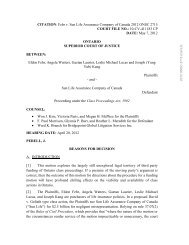
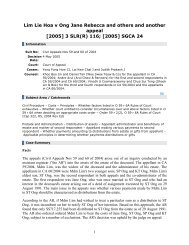
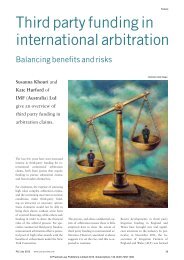

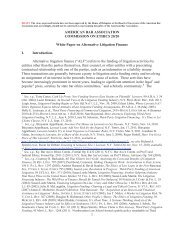

![Hall v Poolman [2009] - Harbour Litigation Funding](https://img.yumpu.com/37488843/1/190x245/hall-v-poolman-2009-harbour-litigation-funding.jpg?quality=85)
